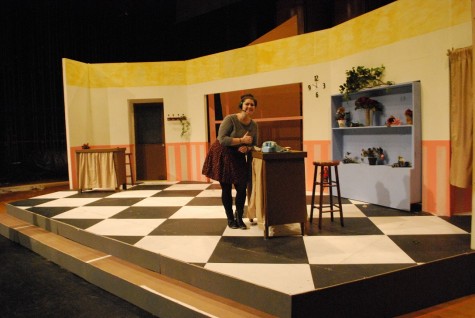Behind the Scenes of Little Shop of Horrors
Having been a stage manager for most of my high school career, I realize how much one person does to make sure the show gets done on time. Most of the crew members will work from right after school and then go to crew afterwards without going home or eating dinner. These people will stay at the school until 11 at night just to get a part of the set completed on time.
Kayley Woolums, master carpenter, (12) is one of the people who stays after school to do running crew and then build the set afterwards.
“I spend a lot of my time at the school, more than I do at home,” Woolums said. After rehearsal would end around 7 or 8 pm, she would then go and build the set until ten or eleven.
Jenna Repkin (11) is the assistant stage manager for the musical this year. Repkin does more than what most people think.
“Up until the orchestra gets to rehearsal, I’m in charge of handling the music. I take attendance every day and make sure everyone is present for the shows,” said Repkin.
Being the assistant stage manager is a tough job. Repkin has to know where 26 people are at all times, and if someone is missing, it’s her job to contact these people.
As a stage manager, my job is to make the conflict, contact, and a line sheet. A conflict sheet has a list of everyone’s schedules during the entire show, these get put on a calendar and is later shared with the director and the assistant stage manager to make sure we are all on the same page.
A line sheet is a document that’s shared with everyone in the cast who has a spoken line. If an actor messes up a line, what they said and what it should be gets recorded. Actors spend the majority of their time reading over their lines. So they can be off book about a month before the show starts. Stress is put on memorizing lines and knowing your blocking, which is where the actor and actress are supposed to be on stage and when.
Actors know if they are not somewhat memorized by a certain date, it makes the rehearsal process more frustrating. The actors go into rehearsal knowing this, thus adding more stress to themselves to get their job done right.
There have been many times when actors have pulled me aside and have asked me to run over lines with them instead of warming up with everyone else. This often helps the actor or actress learn their lines better because I correct them as soon as they say the mistake.
When someone needs any help pertaining to the show, I am the one that helps them with the problem. Whether it be from learning how to say a word or learn an accent that fits the time period, I’m the one that tends to help make the show go smoother.
There are countless amounts of people who put their blood, sweat, and tears into making either the set happen, the lights be able to do cool things, the sound functioning correctly, or the actors getting their lines correct. Musicals and plays don’t happen overnight and more effort gets put into a play than most people spend on homework.

